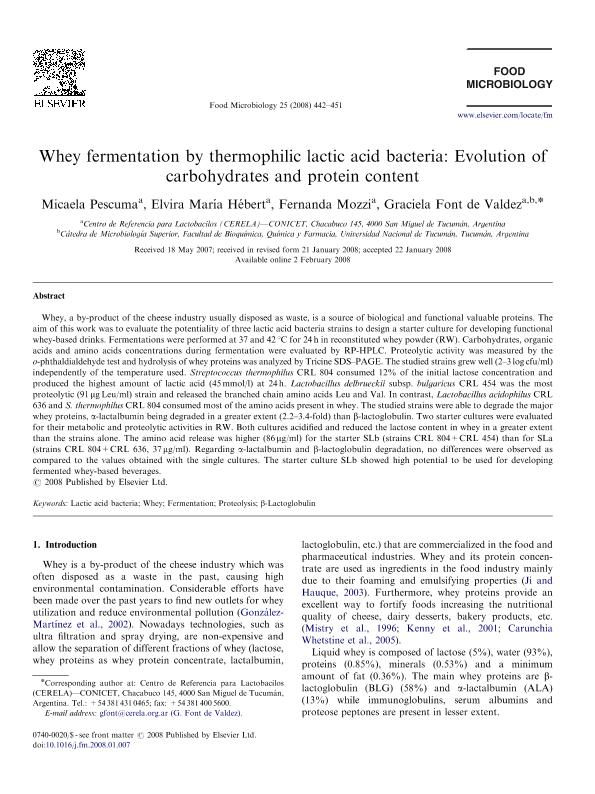Mostrar el registro sencillo del ítem
dc.contributor.author
Pescuma, Micaela

dc.contributor.author
Hebert, Elvira Maria

dc.contributor.author
Mozzi, Fernanda Beatriz

dc.contributor.author
Font, Graciela Maria

dc.date.available
2018-08-15T22:14:14Z
dc.date.issued
2008-05
dc.identifier.citation
Pescuma, Micaela; Hebert, Elvira Maria; Mozzi, Fernanda Beatriz; Font, Graciela Maria; Whey fermentation by thermophilic lactic acid bacteria: Evolution of carbohydrates and protein content; Academic Press Ltd - Elsevier Science Ltd; Food Microbiology; 25; 3; 5-2008; 442-451
dc.identifier.issn
0740-0020
dc.identifier.uri
http://hdl.handle.net/11336/55810
dc.description.abstract
Whey, a by-product of the cheese industry usually disposed as waste, is a source of biological and functional valuable proteins. The aim of this work was to evaluate the potentiality of three lactic acid bacteria strains to design a starter culture for developing functional whey-based drinks. Fermentations were performed at 37 and 42 °C for 24 h in reconstituted whey powder (RW). Carbohydrates, organic acids and amino acids concentrations during fermentation were evaluated by RP-HPLC. Proteolytic activity was measured by the o-phthaldialdehyde test and hydrolysis of whey proteins was analyzed by Tricine SDS-PAGE. The studied strains grew well (2-3 log cfu/ml) independently of the temperature used. Streptococcus thermophilus CRL 804 consumed 12% of the initial lactose concentration and produced the highest amount of lactic acid (45 mmol/l) at 24 h. Lactobacillus delbrueckii subsp. bulgaricus CRL 454 was the most proteolytic (91 μg Leu/ml) strain and released the branched chain amino acids Leu and Val. In contrast, Lactobacillus acidophilus CRL 636 and S. thermophilus CRL 804 consumed most of the amino acids present in whey. The studied strains were able to degrade the major whey proteins, α-lactalbumin being degraded in a greater extent (2.2-3.4-fold) than β-lactoglobulin. Two starter cultures were evaluated for their metabolic and proteolytic activities in RW. Both cultures acidified and reduced the lactose content in whey in a greater extent than the strains alone. The amino acid release was higher (86 μg/ml) for the starter SLb (strains CRL 804+CRL 454) than for SLa (strains CRL 804+CRL 636, 37 μg/ml). Regarding α-lactalbumin and β-lactoglobulin degradation, no differences were observed as compared to the values obtained with the single cultures. The starter culture SLb showed high potential to be used for developing fermented whey-based beverages. © 2008.
dc.format
application/pdf
dc.language.iso
eng
dc.publisher
Academic Press Ltd - Elsevier Science Ltd

dc.rights
info:eu-repo/semantics/openAccess
dc.rights.uri
https://creativecommons.org/licenses/by-nc-sa/2.5/ar/
dc.subject
B-Lactoglobulin
dc.subject
Fermentation
dc.subject
Lactic Acid Bacteria
dc.subject
Proteolysis
dc.subject
Whey
dc.title
Whey fermentation by thermophilic lactic acid bacteria: Evolution of carbohydrates and protein content
dc.type
info:eu-repo/semantics/article
dc.type
info:ar-repo/semantics/artículo
dc.type
info:eu-repo/semantics/publishedVersion
dc.date.updated
2018-07-11T15:23:52Z
dc.identifier.eissn
1095-9998
dc.journal.volume
25
dc.journal.number
3
dc.journal.pagination
442-451
dc.journal.pais
Reino Unido

dc.journal.ciudad
Londres
dc.description.fil
Fil: Pescuma, Micaela. Consejo Nacional de Investigaciones Científicas y Técnicas. Centro Científico Tecnológico Conicet - Tucumán. Centro de Referencia para Lactobacilos; Argentina
dc.description.fil
Fil: Hebert, Elvira Maria. Consejo Nacional de Investigaciones Científicas y Técnicas. Centro Científico Tecnológico Conicet - Tucumán. Centro de Referencia para Lactobacilos; Argentina
dc.description.fil
Fil: Mozzi, Fernanda Beatriz. Consejo Nacional de Investigaciones Científicas y Técnicas. Centro Científico Tecnológico Conicet - Tucumán. Centro de Referencia para Lactobacilos; Argentina
dc.description.fil
Fil: Font, Graciela Maria. Consejo Nacional de Investigaciones Científicas y Técnicas. Centro Científico Tecnológico Conicet - Tucumán. Centro de Referencia para Lactobacilos; Argentina. Universidad Nacional de Tucumán. Facultad de Bioquímica, Química y Farmacia; Argentina
dc.journal.title
Food Microbiology

dc.relation.alternativeid
info:eu-repo/semantics/altIdentifier/doi/http://dx.doi.org/10.1016/j.fm.2008.01.007
dc.relation.alternativeid
info:eu-repo/semantics/altIdentifier/url/https://www.sciencedirect.com/journal/food-microbiology/issues
Archivos asociados
